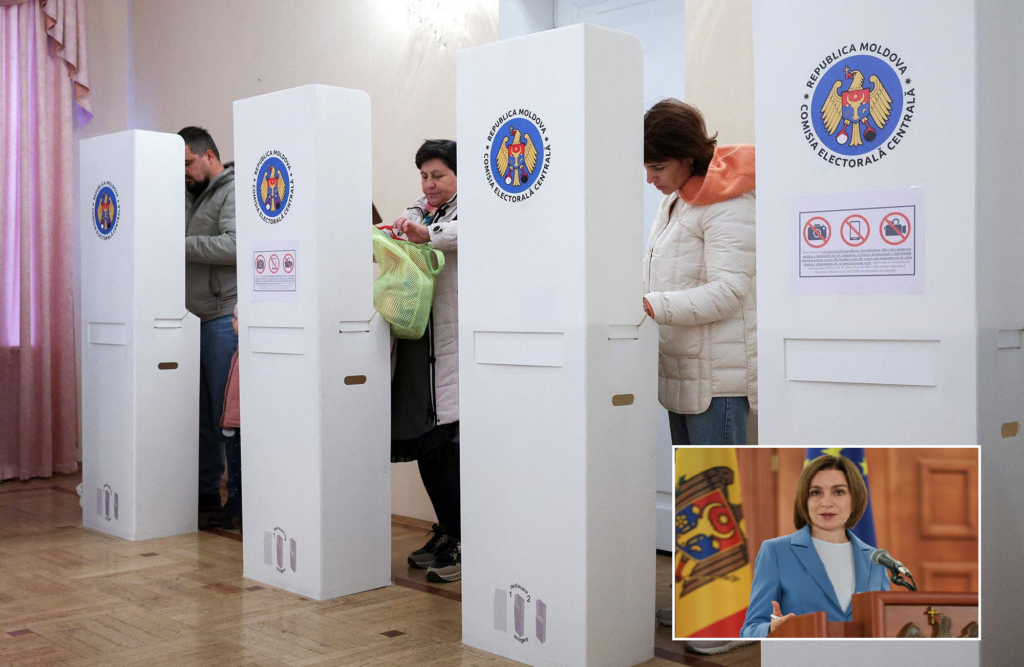
- Moldova has witnessed its parliamentary elections, an election closely watched in Brussels and in the West, as well as in Russia, as the country hangs in balance between the two poles of Russia and the West.
- President Maia Sandu, being pro-EU and pro-NATO, is seen as a leader supported by Western countries, which view Moldova as strategically important due to its proximity to Russia and Ukraine.
- Locals blame Sandu’s leadership for pursuing the idea of a union with Romania and Moldova, a proposal that critics argue undermines Moldovan sovereignty.
- Diaspora voting also raised questions against Russia, which hosts between 350,000 and 500,000 Moldovans, and was allocated only two polling stations, both in Moscow, leaving huge numbers of Moldovans disenfranchised.
Moldova, a country situated in Eastern Europe, has witnessed its parliamentary elections, an election closely watched in Brussels and in the West, as well as in Russia, as the country hangs in balance between the two poles of Russia and the West. The parliamentary election was a litmus test for the incumbent President, Maia Sandu, to continue her political dominance. Rising social challenges, unemployment, and geopolitical uncertainty in Eastern Europe have made governance increasingly difficult for the president.
Moldova, which has 101 parliamentary seats, went to elections. The contest was primarily between two major political parties: the Party of Action and Solidarity, which is the president’s party, and the Patriotic Electoral Bloc, headed by former President Igor Dodon, who is considered anti-EU. The Patriotic Electoral Bloc managed to secure only 24%, while the pro-EU and pro-US President Maia Sandu’s party won the elections.
This election, however, had multiple irregularities. The way it was conducted raised questions not only about Moldova’s democracy but also about external influence over the country, seemingly curtailing opposition voices. President Maia Sandu, being pro-EU and pro-NATO, is seen as a leader supported by Western countries, which view Moldova as strategically important due to its proximity to Russia and Ukraine. Moldova thus acts as a potential logistical hub for Western powers, who do not want any government in Chișinău that challenges their aspirations.
Locals blame Sandu’s leadership for pursuing the idea of a union with Romania and Moldova, a proposal that critics argue undermines Moldovan sovereignty. Many Moldovans view this as an attempt to subsume the country into Romania and align it fully with the West against Russia. Sandu herself holds Romanian citizenship, which fueled concerns about her long-term intentions.
The build-up to the election was especially controversial. Reports of heavy media censorship emerged, with around 20 publications critical of Sandu barred from functioning. The opposition claimed that nearly 100,000 fictitious votes were created, while independent institutions and journalists were prevented from monitoring polling stations.
In Transnistria, the self-proclaimed territory of Moldova, serious restrictions were noted. Out of 30 polling stations, 12 were closed, citing transport congestion as seven bridges were shut down. This prevented nearly 200,000 eligible voters in the region from casting their votes; only 12,000 were ultimately able to do so.
Diaspora voting also raised questions. Russia, which hosts between 350,000 and 500,000 Moldovans, was allocated only two polling stations, both in Moscow, leaving huge numbers of Moldovans disenfranchised. In contrast, Italy, with just 100,000 Moldovans, had 75 polling stations; Germany had 36, France 26, the United Kingdom 24, and Romania 23. This disparity was seen as deliberate suppression of pro-Russian diaspora votes.
Further, opposition leaders such as Irina Vlah of the “Heart of Moldova” party and Victoria Furtună of the “Greater Moldova” party were barred from contesting, officially on grounds of corruption allegations. Critics argue this reflects a growing European trend where any party or leader opposing Western ideology is sidelined as a “traitor.” Similar practices have been observed in Romania, Serbia, and Georgia, raising alarms over the health of democracy in Europe.
In Moldova’s case, the result was clear: Sandu retained power, but by what many call undemocratic means. Meanwhile, Moldovans continue to struggle with rising living costs, high unemployment, and shortages of necessities such as electricity. At a time when the population faces fundamental hardships, President Sandu has prioritised foreign policy, particularly support for Ukraine, over solving domestic crises. Thus, while she remains in power, the legitimacy of the Moldovan elections is being increasingly questioned. For ordinary Moldovans, the urgent issues are not geopolitical alignments but the immediate economic and social challenges that threaten their everyday lives.
Aayush Pal is a freelance writer on contemporary geopolitical developments. The views expressed in his work are entirely his own.
